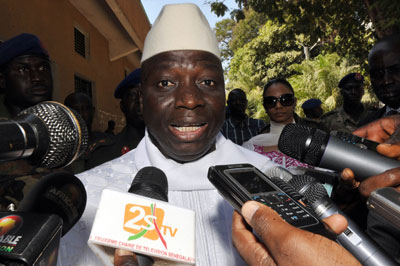Good news for Gambia’s beleaguered independent press has been rare during President Yahya Jammeh’s 17-year rule, but last week brought three potentially positive developments. It’s unclear whether they mark a real change in the status quo, but they may at least increase the resolve of advocacy groups to seek improvements.
On Thursday came a strange twist in the five-year disappearance of reporter Ebrima “Chief” Manneh. Reuters news agency quoted the U.N. High Commissioner for Human Rights, Navi Pillay, as saying that Jammeh had formally requested the United Nations’ assistance in the case. According to Reuters, Pillay said Jammeh’s request was “in response to civil society complaints” about the enforced disappearance of Manneh, who was picked up by state security agents at his newspaper’s office in 2006.
The reported development is surprising because the Gambian government has for years ignored appeals from international institutions, including the U.N., the Economic Community of West African States (ECOWAS), and six U.S. senators, on the Manneh case. The government has consistently denied ever arresting Manneh, despite eyewitness accounts to the contrary. In 2008, the Court of Justice of ECOWAS, of which Gambia is a member state, ordered that Manneh be released and paid $100,000 in damages. The Gambian government has alternately fought and ignored that ruling.
Only recently did Jammeh and Justice Minister Edward Gomez admit any knowledge of Manneh’s status, although their comments contradicted each other as to whether he is still living.
Modou Saidy, press director of the Gambian president’s office, on Friday denied any knowledge of the request for U.N. assistance. “We are not aware of it and cannot confirm it,” he told independent Daily News.
Also last week, the ECOWAS court rejected the Gambian government’s appeal to a decision ordering the state to pay $200,000 in damages to Musa Saidykhan, a journalist who was imprisoned for a few weeks in 2006 and is now living in exile. The Court had established in its December 2010 decision that Jammeh’s security agents illegally arrested and tortured Saidykhan during a crackdown ahead of presidential elections that led to the closure of his newspaper, The Independent.
In keeping with Jammeh’s disdain for the ECOWAS court, presidential spokesman Saidy told CPJ on Friday that the Gambian government doesn’t take the ECOWAS ruling seriously. “What jurisdiction does the ECOWAS court have on the Gambia? These organizations sometimes make these statements but they don’t have any impact on the said government because they are not a court that can pass jurisdiction that will have any effect on the modus of operation of countries.”
Ndey Tapha, the former head of the Gambia Press Union, feels that accumulation of such rulings could have a positive effect. The ECOWAS court’s mandate stipulates unspecified sanctions if any of its 15 member states fail to comply with its rulings.
“In the long it may have some impact if we can compile a number of cases that the government has refused to comply with,” Tapha said. She has lived in exile since June 2009, following her criticism of Jammeh’s comments over the unsolved murder of Deyda Hydara, the co-founder of The Point newspaper who was killed on his way home from work on December 16, 2004.
Indeed, it’s possible that the Gambian government is awakening to international scrutiny. On February 6, a local government official, Chief Mamadou Lamin Baldeh, withdrew criminal defamation charges against Momodou S. Jallow, a reporter with Daily News, local journalists told CPJ. Jallow had been arrested and detained for five hours at the Basang police station for reporting the grievances of local farmers, who accused Baldeh of mismanaging public resources. CPJ had earlier called on the Gambian Police to stop harassing Jallow for giving voice to the farmers.
Such a withdrawal of charges is unusual in the Gambia. But it remains to be seen how responsive the government will be in the weeks and months to come.
